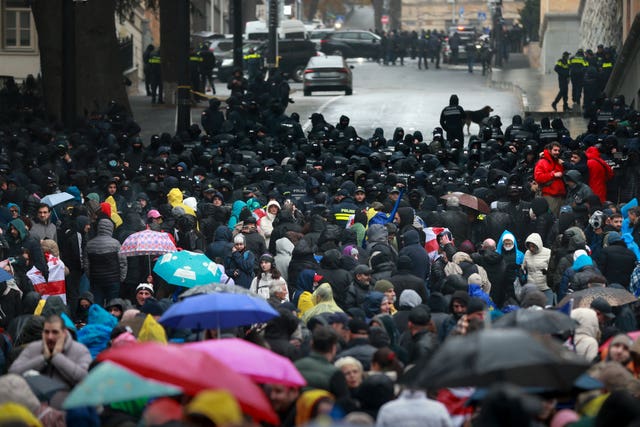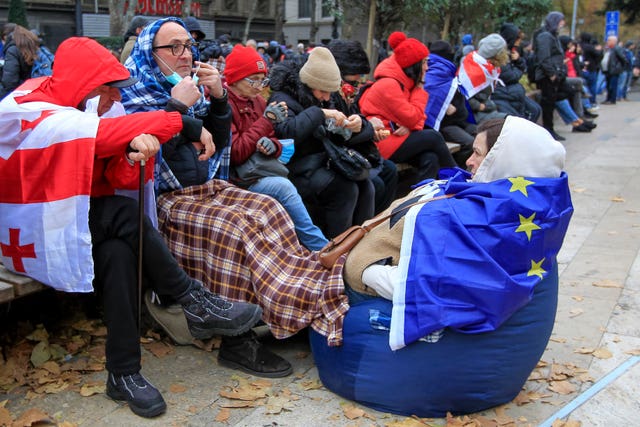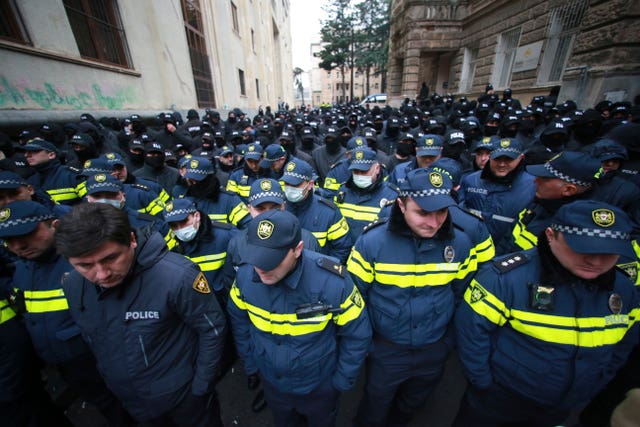Georgia’s newly-elected parliament opened its inaugural session on Monday as opposition politicians and the president boycotted it and thousands of protesters, watched by riot police, rallied outside and accused the ruling party of rigging the vote under Russian influence.
The October 26 election that kept the Georgian Dream party in power was widely seen as a referendum on the country’s effort to join the European Union.
Opposition parties refused to participate in the parliament’s activities, and only 88 politicians, all Georgian Dream members, were in the hall as the 150-seat parliament held its first session.
Nika Melia, leader of Coalition for Changes, vowed the opposition “will do everything to defeat the so-called government, the self-proclaimed government”.
“This is the fight between people fighting for freedom against people who are trying to entrench the deeply authoritarian regime,” he said.

President Salome Zourabichvili, who has rejected the official results and refused to recognise the parliament’s legitimacy, did not attend the opening session.
Ms Zourabichvili, who holds the mostly ceremonial position, said on social media platform X that the parliament is unconstitutional because of evidence of electoral fraud and her refusal to open the session as required by the constitution.
She has filed a lawsuit at the Constitutional Court, arguing that two fundamental principles guaranteed by the constitution – the secrecy of the vote and its universality – were violated.
In a televised statement, she declared that “today the parliament of Georgia no longer exists” because Georgian Dream has “trampled the constitution”.
“I feel sorry for all these parliamentarians who sat there today with frozen expressions, because they know they are the result of falsified elections, and they know they will be locked in this hall for several months or weeks, where none of them has any rights,” she said.
She hailed civil society and in particular the youth for standing up to Georgian Dream, declaring: “The old era reflected in today’s parliament has truly come to an end.”
Ms Zourabichvili was elected by popular vote, but Georgia has approved constitutional changes that abolish the direct election of the president and replace it with a vote by a 300-seat electoral college which consists of members of parliament, municipal councils and members of legislatures of autonomous regions.

On Tuesday, the parliament set December 14 as the date for a 300-seat electoral college consisting of members of parliament, municipal councils and regional legislatures to elect a new president.
It is a new procedure, which will be used for the first time since a 2017 constitutional reform eliminated direct elections for the presidency.
Georgian Dream has a majority in the electoral college and is expected to choose an ally to replace Ms Zourabichvili.
The outgoing president was elected by popular vote in 2018, and her six-year term will end in December. The new president will be elected for five years.
Georgian Dream kept Prime Minister Irakli Kobakhidze in office and its members voted to allow parliament speaker Shalva Papuashvili to keep his seat. The ruling party also controls all key parliamentary positions.
Several thousand protesters, some of them waving Georgian and EU flags, rallied outside the parliament in the pouring rain, facing phalanxes of riot police.
“The government has stolen elections from us,” said student Vakho Sebiskveradze. “It’s not only about the elections – this is about stealing the European future from the Georgian people, the Georgian nation, and the Georgian youth.”

The Central Election Commission said Georgian Dream won about 54% of the vote in October. Its leaders have rejected opposition claims of fraud.
European election observers said the balloting took place in a “divisive” atmosphere marked by instances of bribery, double voting and physical violence.
Critics have accused Georgian Dream – established by Bidzina Ivanishvili, a shadowy billionaire who made his fortune in Russia – of becoming increasingly authoritarian and tilted towards Moscow. The party recently pushed through laws similar to those used by the Kremlin to crack down on freedom of speech and LGBTQ+ rights.
The EU suspended Georgia’s membership application process indefinitely in June after parliament passed a law requiring organisations that receive more than 20% of their funding from abroad to register as “pursuing the interest of a foreign power”, similar to a Russian law used to discredit organisations critical of the government.
Badri Japaridze, leader of Strong Georgia Coalition, pledged that members of opposition parties elected to parliament will stay away from it.
“We are not going to enter this parliament, we boycott it, we do not acknowledge it,” he said.




Why are you making commenting on The Herald only available to subscribers?
It should have been a safe space for informed debate, somewhere for readers to discuss issues around the biggest stories of the day, but all too often the below the line comments on most websites have become bogged down by off-topic discussions and abuse.
heraldscotland.com is tackling this problem by allowing only subscribers to comment.
We are doing this to improve the experience for our loyal readers and we believe it will reduce the ability of trolls and troublemakers, who occasionally find their way onto our site, to abuse our journalists and readers. We also hope it will help the comments section fulfil its promise as a part of Scotland's conversation with itself.
We are lucky at The Herald. We are read by an informed, educated readership who can add their knowledge and insights to our stories.
That is invaluable.
We are making the subscriber-only change to support our valued readers, who tell us they don't want the site cluttered up with irrelevant comments, untruths and abuse.
In the past, the journalist’s job was to collect and distribute information to the audience. Technology means that readers can shape a discussion. We look forward to hearing from you on heraldscotland.com
Comments & Moderation
Readers’ comments: You are personally liable for the content of any comments you upload to this website, so please act responsibly. We do not pre-moderate or monitor readers’ comments appearing on our websites, but we do post-moderate in response to complaints we receive or otherwise when a potential problem comes to our attention. You can make a complaint by using the ‘report this post’ link . We may then apply our discretion under the user terms to amend or delete comments.
Post moderation is undertaken full-time 9am-6pm on weekdays, and on a part-time basis outwith those hours.
Read the rules hereLast Updated:
Report this comment Cancel